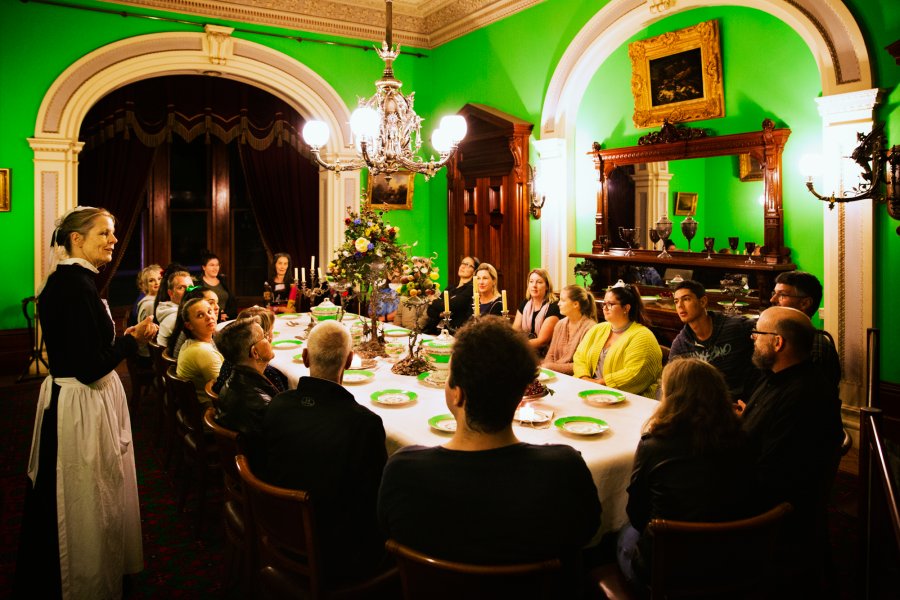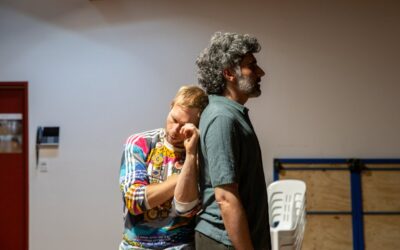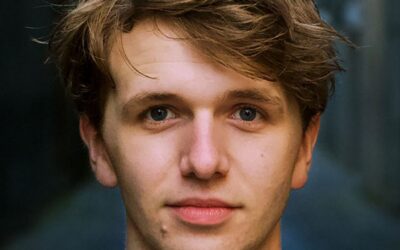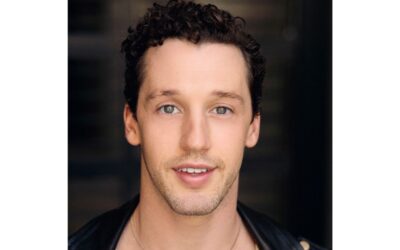Running at the Werribee Park Mansion since 2003, Essence Theatre Productions will very soon be celebrating their 1000th performance of What Was That?, a play written by Alaine Beek and based on the true story of The Chirnside Family.
Beek’s 20 year commitment of performance started with the mansion itself which she describes as a magnificent building that has been so well restored to its 19th century glory. Beek was then drawn to the stories around the mansion, in particular the Chirnside family who built the house and lived in it for 54 years.
“So, for me it was a no brainer to focus the play on the Chirnside family,” says Beek. “Their “upstairs/downstairs” lifestyle is fascinating but was filled with challenges and always doomed to fail.”
Once Beek started researching the Chirnside family itself, she was completed hooked.
Beek explains the work took about six months till opening. “It didn’t want it to be a “tour”, so it was written with two actors and the stories unfolding as they move from room to room,” she says. “We decided to make it immersive for an audience by engaging with them as if they are ‘Old friends of the Chirnside’s’.”
Beek always imagined what a wonderful life owners of wealth mansions would have had. And in comparison, to many, she says, it was. But in researching she also discovered the tragedies and challenges they faced. The head of the family, Thomas Chirnside, asked Mary Chirnside to marry him first, but she chose his brother Andrew instead. Thomas never married and committed suicide aged 72. Beek goes on to explain that Australia at the time was understandably not accepting of the power and wealth held by squatters. In fact, the media, government, and general populus opening criticized and even ridiculed them and so their grand lifestyle ended very quickly early 20th century.
The main discovery for Beek, then, was more about realising we must be careful to not judge previous generations so easily. “We are all of our time,” she posits. “We can learn from the past and the mistakes made, but try to understand the circumstances they were in. Future generations will certainly look back at current times and judge how we are behaving right now. And rightly so. Social media, I believe, has massively amplified our sense of self entitlement, of not taking responsibility for our actions, of individuality over community. But that’s another story.”
The popularity of the work is undisputed – 1000 shows and 20 years prove that – but what has held its longevity? Why does it continue to draw an audience?
“I think it surprises people,” says Beek. “We have so many that come along and say “such and such told me to see it but this is so much more”, etc. The play moves from full-on comedy, to drama, to scary elements. The audience is kept on their toes and with a sense of anticipation of what’s to come.”
“I think as actors we all put so much energy in the performance and relate to each other so well, it’s an exciting experience for an audience. We have four Mr Duncans and three Maggies and all have slightly different styles, so we never get complacent. Ultimately it is word-of-mouth that has kept this play going.”
A show of this durability is sure to have undergone some change with Beek admitting that it has definitely evolved over time.
“If someone gets a new idea and we like it, we try it out. In fact, right now we’re adding a scarier element in the dining room. Sometimes it’s small elements like a prop, sometimes it’s dialogue which takes more rehearsals. As we’ve all been doing this play for literally years, changes keep us excited, which is important for both the team and the audience.”
Beek reveals that probably the biggest change was the ending. “We used to have this funny ending where Mr Duncan reveals he’s actually going to leave and become a travelling magician with Maggie as his assistant. We performed an obviously terrible magic trick to the audience – it was quirky but never felt right. We did a rewrite and rehearsals to make a radical change… but you’ll have to see the play to discover what that is.”
“The joy of owning our own work is we’re all invested in it and can (at any time) come up with ideas for improvement. It also keeps us engaged with the production so we never become complacent.”
As the creator and an actor in the piece, Beek is understandably very proud of the longevity of the show.
“We had no idea it would continue this long. I also love the fact that the actors have stayed for so long. The team has grown over the years and I try to give them as much support, flexibility and respect as I can so they can all do other creative work but immediately come back between projects. There is a wonderful strength, talent and commitment in this team which is at the heart of the work. I do the writing but they are my dramaturge team that are fully collaborative, yet completely honest through the development stage.”
Beek admits to having had some massive hurdles over the years but had managed to work around them. ETP is the resident theatre company at the Werribee Park Mansion and, as such, are strict around conservation of the house itself and security. “In fact, we are a 20 year living experiment! Highlighting that a theatre company can have an immersive audience experience in an historic setting and operate it fully independently of venue management.”
The joy for Beek is working in a stunning space with such incredible actors and individuals.
“They lift me. And I don’t care a hoot if that sounds corny. It’s true.”
“I always feel privileged to perform in such a setting. Even the days where I think I’d rather stay at home, once I’m there I love it and always feel fully energised at the end. As a creator, I just want to keep doing good work.”
With small audiences of only 26, the roaming play is intimate and engaging. The audience are taken through nine lavish rooms during the performance, they are even invited to sit around the grand dining room table – something normally closed off to the public.
“We knew this was never going to be a high profit show with a maximum of only 26 in an audience, so we wanted to make the experience as immersive as possible and use the space to its maximum capacity,” says Beek. “We wrote the story around the rooms that are presented historically, (i.e., not display rooms with glass cabinets). We knew the audience would want to see the mansion itself and even though it’s open during the day it has a completely different feel at night It seems to come alive. Maybe it’s because of the energy in the room, the shadows, the lighting, the sounds? Probably all of it. I had to add the scary element. Creeping down the corridors in the dark is soooo much fun.”
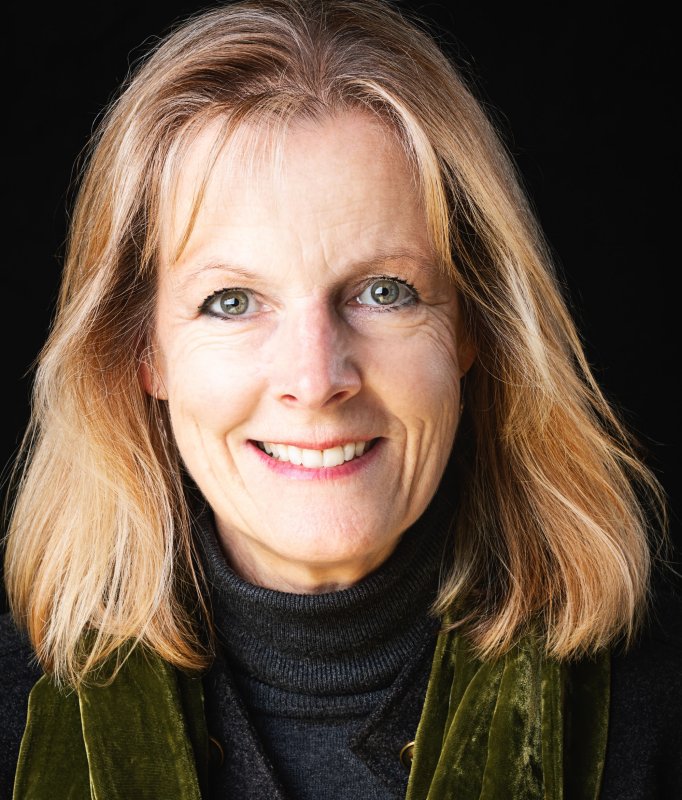
A classic upstairs/downstairs story of colonial Australia, this is a play written of its time. The late 19th century held very different and quite shocking attitudes towards women with this disparity being a consistent theme throughout the play.
“Mr Duncan even takes the men into the library to talk “Serious Men’s Business”, so the audience is split for one scene. The men in the audience engage with Mr Duncan, who is severely condescending to women but exaggerated to make the point in an entertaining way. The women left in the library with Maggie, laugh at this and share their own thoughts on men’s attitudes.”
Beek and company are also respectful of the Chirnside history and whilst Maggie and Mr Duncan are fictional characters their stories about the Chirnsides are all based on truth. “We wanted to also include the challenges and terrible tragedies they faced. I think nowadays we are far too quick to judge. Especially with social media, it has become point and destroy. A modern-day witch hunt. Everyone has their story, their challenges. This is an important element in What Was That?”
“Around the scary elements, we also don’t take ourselves seriously and never try to hoodwink an audience into believing there are real ghosts. The scary element is theatre. Fully engaging, but still theatre. I’m often asked at the end of the play if I’ve seen a ghost and I’m always honest and say “never!”.
But then I will tell the about the times I have been fully scared in the house.”
With so much in the production, Beek would like audiences to share their thoughts on the different aspects. How they felt about being separated? How they felt about there being no fourth wall and the audience being involved in the story? Their thoughts on the tragedies and how hard that would have been on the family? Things they noticed or not as movement progresses throughout the house?
Ultimately, Beek wants them to want to come back and discover more.
Although What Was That? is a story couched in historical fact, it’s also highly entertaining surprising, and incredibly funny. “It is fully engaging, immersive and it will be different to what you expect,” says Beek. “You will go from laughing out loud, to listening quietly to looking over your shoulder. And all this in a stunning setting of the Werribee Park mansion.”
Saturday 29 July, 8pm (show 998), Saturday 5 August, 8pm (show 999), Saturday 12 August, 8pm (show 1000)
www.essencetheatre.productions
What Was That? can be part of a whole weekend experience in regional Victoria. Lancemore Mansion Hotel and Spa is situated right next door to the mansion, there’s also Shadowfax Winery, the State Rose Garden, The Refectory and the historic farm all within walking distance of each other. And it’s a two-minute drive to the Werribee Open Range Zoo and Golf Course

